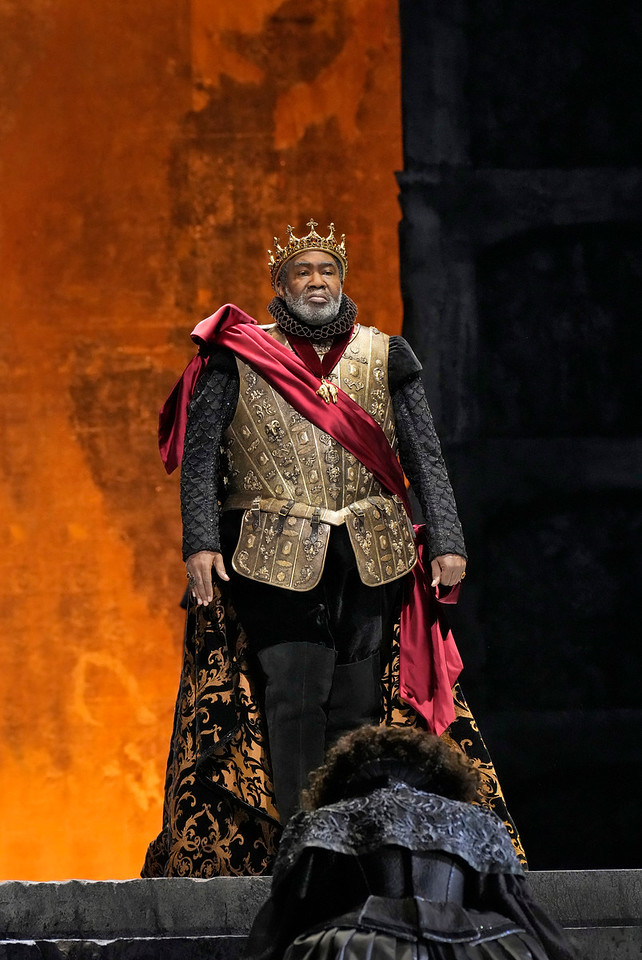On February 28, the Metropolitan Opera displayed for the first time in its history the Don Carlos by Verdi in its original version in French, announced with great fanfare. However, the show, broadcast in cinemas on March 26, is perplexing as to the version offered. For the record, remember that there are two scores in French of Don Carlos : the one that Verdi completed in 1866 for the rehearsals of the work and the one that was given during the premiere on March 11, 1867 in which more than five passages had been deleted, in particular the first scene of act one, between Elisabeth and the woodcutters, the duettino of Elisabeth and Eboli which precedes “O don fatal” and part of the large ensemble which concludes act four, the music of which Verdi reused in his Requiem. It was apparently the 1867 version that the Met opted for, with a few borrowings from the four-act version first performed in Italian in Milan in 1883, notably the duet between Philip II and Posa on two and the nostalgic cue from Elisabeth when her husband presents her with his jewelry box at the beginning of the fourth (in Italian “Ben lo sapete, un dì promise”). On the other hand, the end of this act has been preserved in its entirety. On the other hand, we can regret the deletion of the scene where Elisabeth offers Eboli to take her place at the party which is being prepared at the beginning of the third, a scene which justifies Don Carlos’ mistake which follows. The ballet also fell by the wayside. As we can see, we were treated to a sort of hybrid Patchwork when the Paris Opera gave the 1866 version in the fall of 2017 without any cuts.
David MacVicar situates the action in its original context. The unique decor, signed Charles Edwards, consists of two gigantic walls, rounded in shape, pierced with cells that sometimes evoke catacombs, sometimes a theater in ruins. In the first and last acts a giant censer hangs from the hangers, in the fourth there is an imposing Christ on the cross. No gardens or church in this dark and disturbing universe. The execution of the Flemish deputies by strangulation takes place on the set and at the end, Don Carlos is stabbed by the king’s guards while Posa, who appears in a white light drags him with him. The direction of actors on the whole remains conventional, we knew the Scottish director more inspired.
Don Carlos © Ken Howard / Met Opera-
The distribution, unequal, does not call for praise. Meigui Zhang is a charming page with a tangy timbre, the cavernous timbre of Matthew Rose makes his monk a mysterious character at will while the Grand Inquisitor of John Relyea impresses as soon as he enters the stage thanks to his imposing voice and his disturbing make-up. In contrast Jamie Barton proves to be not very credible as Princess Eboli, her outrageous acting borders on the ridiculous and her bearing is not what is expected of a woman of her rank. The vocalizations of her song of the veil are laborious, however, the insolence and the extent of her means to which she gives free rein in “O don fatal”, earned her an ovation from the public who apparently took their ears full. Since his Parisian Rodrigue in October 2019, the voice ofEtienne Dupuis has gained in confidence and breadth, he portrays an exalted and youthful hero, touching in his exchanges with Carlos, excessive when he evokes Flanders, especially in front of the king whom he easily dominates. In the prison scene, the elegance of his phrasing and the multiple nuances with which he sprinkles his vocal line contribute to making the death of his character a particularly poignant moment. At the end of the performance, the public will warmly applaud this high-flying incarnation.
As we have said, facing him the Philip II ofEric Owen does not weigh. The American bass-baritone portrays a self-effacing king lacking in authority, especially in his confrontations with his wife. Her great air “She does not love me” sung with a dull and monochromatic voice arouses very little emotion. This singer, whom we have known much better in other repertoires, finds his limits here. Sonya Yoncheva who had conquered the Parisian public five years ago with his youthful and moving Elisabeth, renews his exploit here. The purity of her voice, the delicacy of her singing line and the subtlety of her playing, make her a queen close to the ideal. Her “You who know nothingness” in which she tastefully varies the colors is a great success despite a confidential low register that she has the intelligence not to emphasize. At last, Matthew Polenzani is the third winner of the evening. He seizes with ardor the role of Don Carlos of which he makes a distraught hero who captures the attention durably. The nobility of his singing, the refinement of his nuances and his impeccable diction offer moments of pure happiness. The poignant outbursts of his revolt after Posa’s death would draw tears from the stones.
At the desk Patrick Furrer replaced Yannick Nézet-Seguin suffering. The young Swiss conductor seems at times overwhelmed by a score of which he does not always find the right pulsation, as evidenced by some discrepancies during act three. He proves to be more convincing during the last two acts, in particular in the finale of the fourth of which he exalts the grandiose aspect.
On Saturday, May 7, the Metropolitan Opera will broadcast in the cinemas of the Pathé Live network Turandot by Puccini with Liudmyla Monastyrska in the title role.
–


